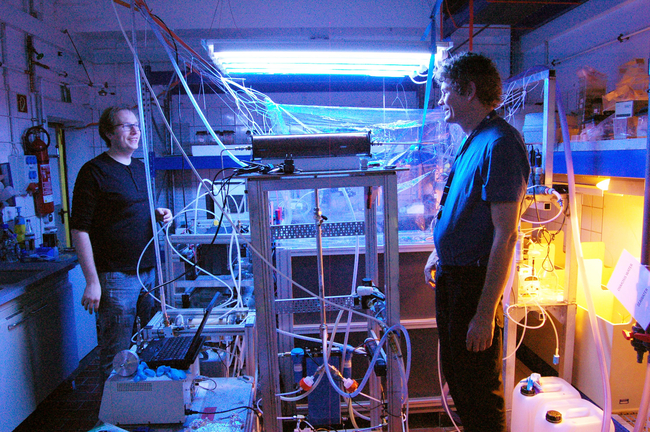Marine aerosol particles – tiny particles above the sea – can affect the radiation balance of the earth directly and indirectly by absorption and reflection of solar radiation. These aerosol particles can arise in various ways, for example by interactions between ocean and atmosphere and become further processed by different environmental conditions. Important processes in the formation of marine aerosol particles are the so-called "bubble bursting", where organic material from the seawater is directly introduced into the atmosphere by bursting bubbles at the sea surface. Furthermore, the emission of volatile compounds from the oceans plays an important role in the formation of aerosol particles.
To better understand sources and transport pathways of marine aerosol particles and to estimate the importance of marine particles for the global climate observation, it is neces-sary to know their chemical composition and microphysical and optical properties. In addition to sea-salt, marine aerosol particles contain a majority of organic compounds that significantly affect the particle properties. Besides marine aerosol particles, the sea water is investigated as an important source of these compounds.
Within the MarParCloud ( Marine biological production, organic aerosol particles and marine clouds: a Process Chain) project a compact network consisting of the TROPOS, the ZMT, the IOW and the Universities of Oldenburg and Hamburg will be built. The aim of this network is to investigate the entire process chain of biological production of organic matter in the oceans, the export of organic matter to marine aerosol particles and finally their abilities to act as cloud condensation nuclei and ice nuclei. Tank experiments and laboratory studies will be performed at the marine experimental facility of the ZMT and in the seawater outdoor tanks at the ICBM. Furthermore, a comprehensive field campaign will take place at the Cape Verde Atmospheric Observatory (CVAO). The modeling in MarParCloud will incorporate the experimental results and derived parameterisations in a process model that will be used beyond the project.
Projektpartner |
|---|
|
Leibniz Centre for Tropical Marine Research (ZMT) Leibniz Institute Tropospheric Research (TROPOS) - Koordination Leibniz Institute for Baltic Research (IOW) Institute for Chemistry and Biology of the Marine Environment (ICBM), University of Oldenburg University of Hamburg Cape Verde Atmospheric Observatory (CVAO) |





